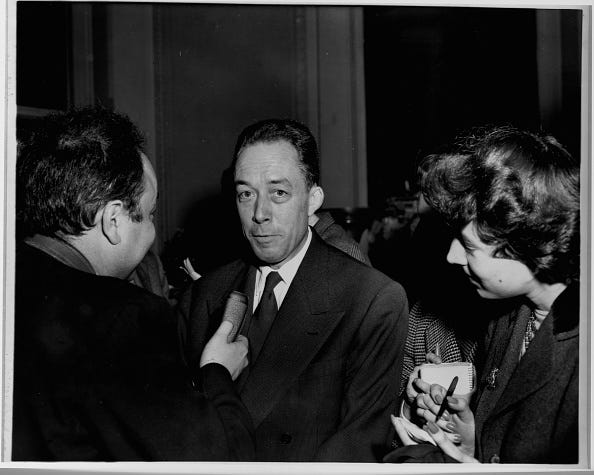Rebel, Rebel
Albert Camus and living as an act of revolt

“I opened myself to the gentle indifference of the world.”
~ Albert Camus, The Stranger
“There have been as many plagues as wars in history; yet always plagues and wars take people equally by surprise.”
~ Albert Camus, The Plague
“To create today is to create dangerously. Any publication is an act, and that act exposes one to the passions of an age that forgives nothing.”
~ Albert Camus, Resistance, Rebellion and Death: Essays
Rebel, Rebel
By Joel Bowman
On this day in 1960, a luxurious Facel automobile bound for Paris veered off a long, straight country road near Sens and collided with a plane tree. The driver, French publisher Michel Gallimard, died in hospital a few days later. His wife and daughter, in the rear seats, were unharmed.
Found among the wreckage were 144 pages of handwritten manuscript, entitled Le premier Homme (The First Man). Their author, who believed this would be his finest work yet, had been riding in the passenger seat. He died instantly. Albert Camus was 46 years old.
In some ways, it was a small miracle that the Nobel prize-winning author had made it even this far. Raised in a poor, working class town in his native Algeria, the precocious Camus was awarded a scholarship to study at a prestigious lyceum near the capital, Algiers. When he was 17 years old, he was diagnosed with tuberculosis and was thus obliged to move from his family home to his uncle’s residence. Encouraged by Uncle Gustave and guided by his teacher, Jean Grenier, Camus there began to read philosophy. The young man found himself particularly impressed by the ancient Greeks as well as Friedrich Nietzsche, a thinker many consider a precursor to the school of existentialism, with which Camus was later lumped (much to his own frustration and protest).
In a strange twist of fate, Camus’ diagnosis also saved him from a career in academia as a university lecturer and, arguably the more clear and present danger, being accepted into the French army, to which he volunteered shortly after Germany marched on France during the devastating Western Campaign of 1940.
In lieu of the first scaffold – that of the frustrated college professor – Camus completed his first cycle; the novel The Stranger, the philosophical essay The Myth of Sisyphus and the play Caligula.
In lieu of the second fate – almost certain death, face down in Somme mud – he completed his second cycle; the novel The Plague, the philosophical essay The Rebel and the play The Misunderstanding.
The Paradox of the Absurd
As it happened, misinterpretation (either accidental or deliberate, as on the part of his adversaries) would feature prominently throughout Camus’ career. Though he spent much of his life passionately engaged in politics, particularly on the Algerian question, where he abhorred colonialism, his nuanced positions won him no shortage of enemies on both sides of the political aisle. Briefly a member of the French Communist Party, he nevertheless disavowed Marxism, and was later an outspoken critic of Stalin’s post-war occupation of Eastern Europe and an avid supporter of the uprisings in cities trapped behind the Iron Curtain. He was equally critical of fascism at home in France and across the Continent, leaning instead toward a stripe of anarcho-syndicalism, in which he advocated for solidarity and brotherhood among freely associating, sovereign individuals in the face of governmental totalitarianism emanating from the left and the right.
Throughout his philosophical works, Camus sought to acknowledge, confront and eventually overcome the “Paradox of the Absurd” – as he saw it, the direct result of the “confrontation between human need and the unreasonable silence of the world.” Camus rejected spiraling nihilism in the face of the absurd, arguing that suicide was itself an affront to human values and freedom. Instead, one must live, one must create, one must in the end be, not because he is promised deliverance, but despite the knowledge that he is not. From The Myth of Sisyphus and Other Essays:
“To work and create 'for nothing', to sculpture in clay, to know that one's creation has no future, to see one's work destroyed in a day while being aware that fundamentally this has no more importance than building for centuries – this is the difficult wisdom that absurd thought sanctions. Performing these two tasks simultaneously, negating on one hand and magnifying on the other, is the way open to the absurd creator. He must give the void its colors.”
― Albert Camus, The Myth of Sisyphus and Other Essays
Poetic irony, then, that a diagnosis of tuberculosis (a veritable death sentence for writers and thinkers down the ages, from Kierkegaard to Kafka... Whitman to Weil... Maupassant to Orwell... Rousseau to Shiller to Chekhov to Lawrence, et al. ...) should spare the young Camus a similar fate, delivering him instead to a life of letters and metaphysical contemplation.
Tragic irony, too, that he who rebelled against the absurdity of man’s ultimate fate, his unshakeable mortality, who met the “unreasonable silence” of an indifferent world with his own powerful, deliberate act of living, who created in the face of the nothingness he saw in waiting, should be delivered from the disease’s icy grip, from this world into the rushing void... through the windscreen of a speeding vehicle.
It was William Faulkner who wrote Camus’ obituary, underscoring the age old epitaph when he observed:
“When the door shut for him he had already written on this side of it that which every artist who also carries through life with him that one same foreknowledge and hatred of death, is hoping to do: I was here.”
~ William Faulkner, Obituary for Albert Camus
Albert Camus ~ 1913-1960 ~ requiescat in pace
Joel Bowman
The Modern Flâneur


Rebel Yell.
Enriching read.